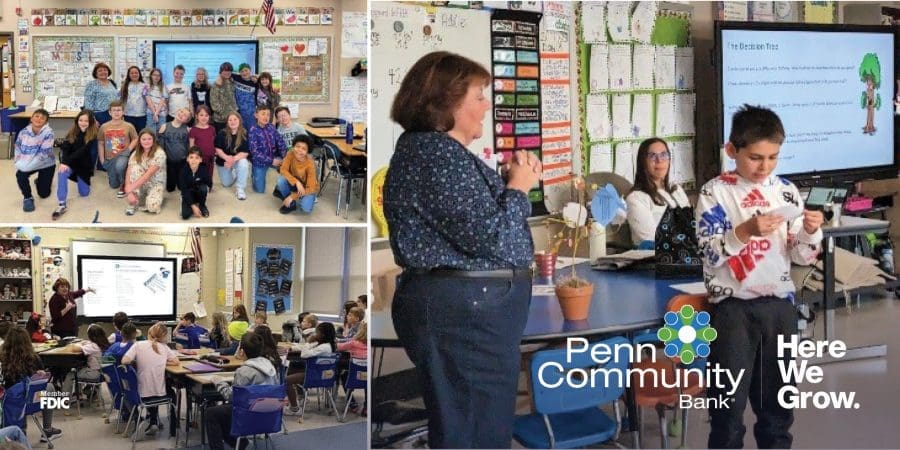
Meet Antoinette, retired Penn Community Bank branch manager who has taken her passion for financial literacy full-time. After a rewarding career in banking, Antoinette realized that she loved the teaching aspect of her job more than anything else.
With retirement approaching, she wanted to continue her sharing banking expertise with others – but this time, in the classroom. So, she took on her first assignment: creating a financial education presentation for each grade level.
In order to fully understand Antoinette’s drive for financial education, we must first understand her background. She grew up in a big family with one working parent that lived paycheck to paycheck. There was no room for extra spending, and there especially wasn’t room for saving.
“When I have my own life, I’m going to do things differently,” Antoinette remembers thinking.
Drawing on both personal experience and banking resources, she developed an engaging lesson tailored for each grade level that draws on real-life examples and scenarios that make the information easily digestible for students.
“And fun, of course. Banking doesn’t have to be all facts and figures,” she says.
Depending on the age group and geographical area, Antoinette has learned to adapt her lesson to make it most ideal for the students’ situation. For example, some classrooms are majority students from low-income households. With that in mind, shifting the presentation towards earning money and budgeting is likely most beneficial to students. Ensuring the information is applicable to their real-life situation is crucial.
One of Antoinette’s favorite classroom tools is her self-made “decision tree.” Having money is about making decisions and dealing with the consequences. Her decision tree illustrates just that – with each leaf posing a real-world question about spending.
Putting some focus on the psychology behind money is important, too. Money is emotional – it means something different to each person and everyone has a different relationship with it. She finds this discussion to be particularly valuable in middle and high school grades, where students can more deeply reflect on their family’s situation and why it may be the way it is.
There’s a lot of important financial concepts people must understand – earning, savings, spending, borrowing – it’s nearly impossible to focus on just one. An overarching concept everyone must understand, though, is being responsible with your finances, says Antoinette.
Antoinette believes that banks, particularly community banks, play a great role in financial education. Whether it’s having information and resources for children at the branch or doing financial literacy presentations in schools, it’s important to come to their level. Banking and finances can be scary or overwhelming, so the information must be succinct.
The most rewarding part of it all for Antoinette? Seeing a student from a presentation come into the branch to open their very first checking or savings account. It’s a proud moment for everyone involved, from the parent and child to the banker helping them.
This Financial Literacy Month, commit to educating yourself and others about best practices for finances and take steps towards achieving your financial goals. Financial education will help build a brighter future for yourself, your family, and your community. If you don’t know where to start, visit your local community bank and speak to a representative.
Q&A with Antoinette
In the coming years, how do you hope to see National Financial Literacy Month evolve?
In connection with their community bank, schools need to make it a priority to teach financial education. They have a captive audience that’s ready to learn, and school-age is the perfect time to start talking about financial literacy. Whether it’s part of math, business, or home economics, it’s important that schools find a place to work it in. Financial Literacy Month is the perfect opportunity for schools to partner with a community bank and bring in a banker to interact with and educate the students.
What advice would you give someone who wants to improve their financial literacy? Do any resources come to mind?
It’s not easy and it takes commitment. You have to actually work it if you want to change your financial outlook. Start learning and take action on your finances right away – the earlier you start, the easier it is to develop healthy habits and secure your financial outlook.




